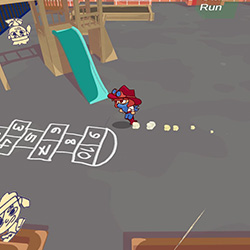Overview
DCMS has announced continued support for the UK Games Fund as part of a joint plan between Government and industry to drive growth, build talent and develop skills across the creative sectors.
This funding will offer £50,000 – £150,000 commercial games-for-entertainment content grants.
The Applicant Company
- UK registered SME with PAYE employees engaged in games development work in the UK,
- Ownership explicitly set out and with UK-based founder-director/s as significant shareholder/s,
- The total previous grant and other subsidies not exceeding £315,000* over a three-year fiscal period (including any prior funding from us) in order to comply with UK subsidy control legislation. This funding is being operated within the terms of the minimum financial assistance (MFA) exemption*
- Not presently facing any acute working capital challenges or liabilities that put the business under any unusual levels of risk, and
- The founders able to fully articulate the rationale for all structural aspects of the business and the growth strategy in the context of building and growing a financially-sustainable UK-based games development studio and growing PAYE employment, particularly where there are any non-standard business configurations such as dispersed teams / high levels of contracting.
- We normally expect companies to not be a recently established start-up, or formed for the purposes of securing this grant. A start-up may be considered where supported by the founders’ effective articulation of the structural rationale as above alongside an immediate publishing opportunity secured because of founder track record.
- Some PAYE employees already onboard, in addition to the founding director/s.
- If previously funded by UKGTF, being able to demonstrate positive business progress as a result of the earlier support.
- Prior founder(s) track record having taken games through to completion and shipping.
The Development Approach
Requirements:
- Funding being required to support a mix of existing and/or new employees, alongside a lesser proportion of contracting, and
- A clear explanation of the development approach in terms of the planned physical location/s of work in the UK and access to talent.
Preferences:
- A positive bias towards employed staff rather than contracting in the planned development approach.
- Opportunities for networking/learning between team members – understanding this will be proportionate to the circumstances of the applicant’s on-site or remote working arrangements.
- Positive impacts on under-representation at a company level arising from the planned hires and a longer-term commitment to addressing any under-representation in the development team. See guidance here.
The Project
Requirements:
- Prototype in place,
- IP owned by the applicant or licensed on terms that are aligned with the project’s long-term requirements,
- Your project must not include gambling elements or mechanisms which could be perceived as such, or any content that we deem to be potentially reputationally damaging (solely at our discretion),
- A primary focus of the applicant’s current development portfolio,
- Commercial games for entertainment focus with potential to secure a commercial audience at scale,
- Eligible costs are staff and contractor costs for hands-on development activity,
- Ineligible projects include non-commercial, non-entertainment games, student projects/graduation works, games incapable of obtaining a PEGI rating, corporate/marketing functions (etc),
- Evidence of understanding of the target audience and plans to access that audience,
- A credible funding rationale in terms of scale of the request for grant funding in the context of company finances, and
- Ability to demonstrate additionality of this funding.
Preferences:
- Project IP originated and developed by the applicant.
- Use of this funding early / mid development cycle.
- Funding to be spent over a 6–12 month period commencing within four weeks of offer, but applications outside this range will be considered. Financial year end issues may need to be managed in project plans and we will advise if that is the case.


















Leverage
Requirements:
- Overall project costs at least double the requested grant, and
- Strong additionality case, with our funding making a demonstrable difference in terms of unlocking additional resources, new relationships, platform or audience access, etc. Note that 30% of the grant will be held back until that additionality is fully contracted.
Preferences:
- Direct leverage of other private capital such as a publisher advance arising from our funding award, including evidence of such leverage. The balance of our grant will be payable after such leverage has been paid.
- Our grant being the lowest possible proportion of project costs.
How It Works
In summary:
- Successful grantees will receive 70% payment of grant in advance of commencement, usually within four weeks of contract completion. The balance of the 30% will be paid when leverage is secured and committed to the project.
- Grantees will be required to submit monthly update reports on progress.
- The final report will also include an impact survey and an accountant-certified financial report covering all project spend, both of which are compulsory.
- We are intending that the content fund intervention will help to develop the field of ‘foundership’ in the indie games sector and we’ll be directing some of our content fund monitoring and community engagement towards this aim.
- An external evaluation of the content fund will run in parallel and you will be required to engage with the evaluation contractor at mutually convenient points.
- The extent to which any tax reliefs or expenditure credits are claimable or otherwise on the portion of your project expenditure that is fully funded by us may vary according to the interpretation of eligible expenses incurred, the grantee company tax position and/or other variables outside our control. You should seek advice from your professional adviser in this regard.
All Directors of funded companies will need to verify their identity on Yoti.
Grants Available
FAQs
Previous prototype funding doesn’t rule you out of a content fund application. However, you’ll need to show how that previous project has contributed towards the company’s growth strategy; e.g. securing an early-access audience or attracting publisher interest. Your content fund application doesn’t have to be for the same project that received funding, as long as you can demonstrate the step change that arose as a result of it. For example, that could be how you’ve bolstered your development team with new hires and have more planned. We cannot normally accept an application for another stream of funding to run concurrently with an existing UKGF grant or follow on immediately afterwards.
We aim to have a ‘plain English’ offer letter that sets out the key terms without imposing any post-project repayment, revenue share or IP ownership liabilities. Payment of grant will be up-front. There will be obligations for you to return the entire grant to us during the project if you fail to meet any of our reporting and monitoring obligations or diverge from the agreed plan. Our well-trodden community contribution obligation will apply, requiring you to contribute company time to foundership and ecosystem development along the way, post- project. Where the award has been made according to claimed leverage (such as a future publisher advance) there may be specific conditions in that regard.
While your total project budget may be more than any grant awarded as part of the content fund, we’ll normally expect the funded portion of the work to last 6-12 months. Our financial year end is 31st March and whilst project spend can happen in a financial year following the year of award, we may require start dates to run parallel to our in-year funding allocations. Applicants are advised that submissions to the content fund around year end may be affected accordingly.
We’re aiming to have the minimum level of intervention, always less than half the budget, and applications with a lower rate of intervention will be prioritised.
Leverage of third-party funds triggered by our grant will add to the feasibility of the information you share in your application. A commitment from an investor/publisher demonstrates market credibility in your application.
Our funding should help to unlock additional funds, as leverage is a key fundamental of the eligibility criteria. We will only release the second tranche of grant payment (30% of the total applied for) when we are satisfied the leverage claimed in the application has been achieved.
Funding is only provided for UK PAYE employee and contractor costs for those engaged in hands-on content development. Directors loan accounts, certified accountants report, marketing, business development and community management costs are ineligible expenditure. You will be unable to claim for any tax credits on expenditure arising from any of our grant.
We’re primarily seeking projects that are post-prototype development and reflect a journey to complete that particular game IP for the first time, rather than follow-on activities. That’s because we are keen to see transformational projects that ‘move the growth needle’ at studios. There may be special circumstances (e.g. revival of an old IP alongside renewed publisher interest and third-party investment) where a case otherwise can be made but our starting answer to this question is ‘not normally.’
Securing our funding doesn’t rule this out but you must bear in mind that you will be subject to monitoring and post-project reporting to ensure there is no cross-subsidy arising from our funds. For example, the post-project certified report will require UK PAYE and contractor invoice records fully reconciled with bank transactions for those work elements funded by our grant.
At present we are funded until 31st March 2026. We’ll hope to accept submissions up to this date. However, this situation is subject to change and high demand could lead us to closing for applications much earlier. We suggest that you get your application together as early as possible but use your time wisely to refine your pitch for funding, ensuring all relevant information is present and correct.
You’ll be required to submit monthly progress reports that indicate progress with the work and spend against predictions. This will include periodic update videos and financial summaries. We’ll also be interested in the growth trajectory of the company and how the founder/s is/are gearing up for the projected scale of activity. You’ll be required to submit a closing financial report certified by a chartered accountant, with the project expenditure set in the context of whole company finances, along with an impact survey. This project is being monitored in real-time. You may be asked to join an interview at a convenient time.
Only the following types of low value subsidies are included in the £315,000 limit: (i) MFA; (ii) SPEI (services of public economic interest); (iii) aid given under the EU State aid de minimis regulations either before the end of the implementation period of 31 December 2020 or after this date if by virtue of the Northern Ireland Protocol; and (iv) subsidies given as small amounts of financial assistance (SAFA) under Articles 364(4) or 365(3) of the UK-EU Trade and Cooperation Agreement after the end of the implementation period but prior to this section of the Act coming into effect. A company may have received subsidies under a subsidy control scheme (either a new one which has been assessed against the principles or a legacy scheme) which would not fall into one of these categories so would not count towards the £315,000 limit.
Expressions of Interest Now Open
Registration on our grant application platform is required.